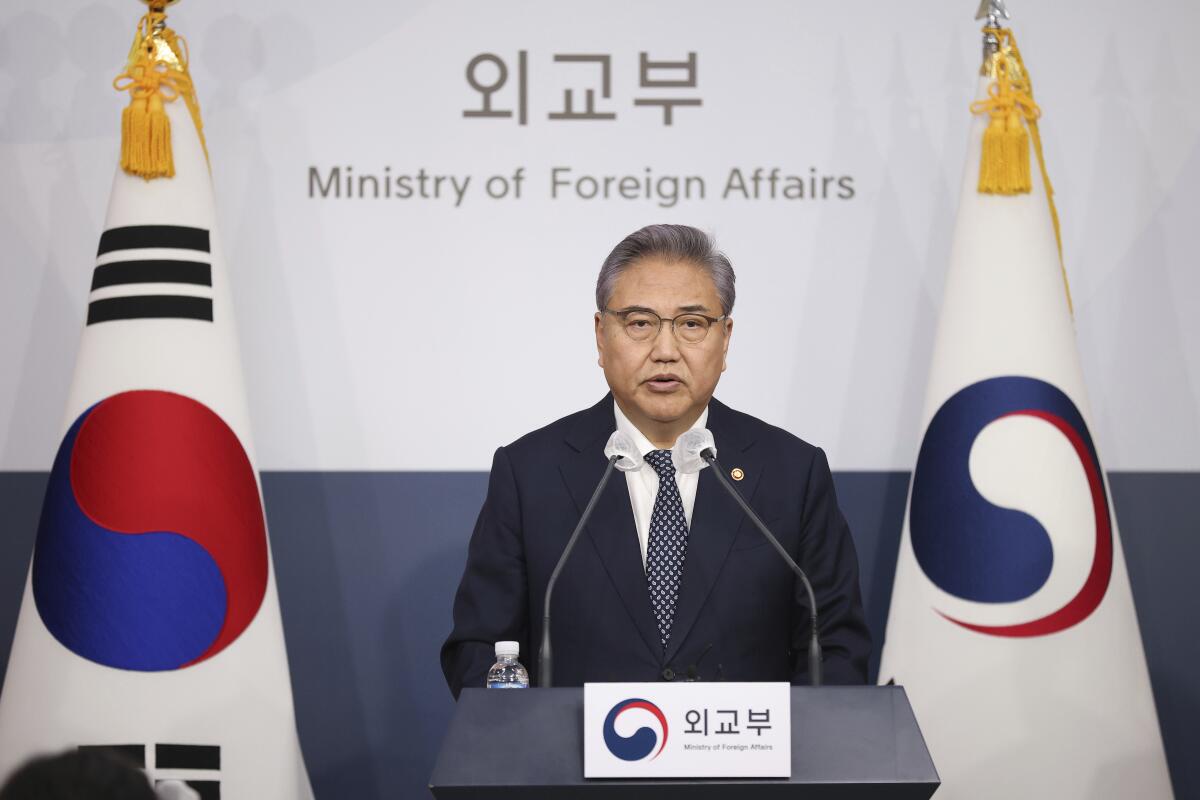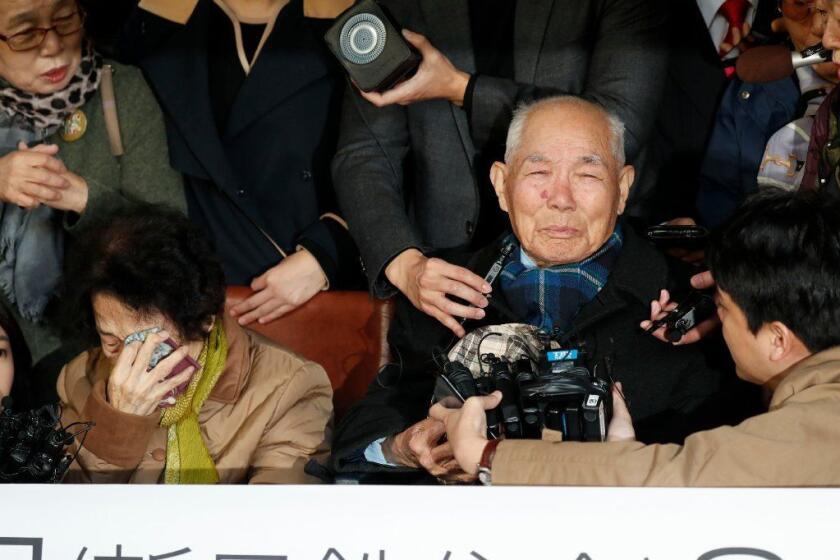South Korean plan aims to heal forced labor feud with Japan but draws backlash at home

- Share via
SEOUL — South Korea took a step toward improving ties with its traditional rival Japan on Monday, announcing a plan to compensate Koreans who performed forced labor during Tokyo’s colonial rule that doesn’t require Japanese companies to contribute to the reparations.
The plan reflects conservative President Yoon Suk-yeol’s push to mend frayed ties with Japan and solidify security cooperation among Seoul, Tokyo and Washington to better cope with North Korea’s nuclear threats. President Biden quickly hailed it as “a groundbreaking new chapter” of cooperation between two of the United States’ closest allies.
The South Korean plan, which relies on money raised in South Korea, drew immediate domestic backlash from former forced laborers and their supporters. They’ve demanded direct compensation from the Japanese companies and a fresh apology from the Japanese government.
Ties between Seoul and Tokyo have long been complicated by grievances related to Japan’s brutal rule of the Korean Peninsula from 1910 to 1945, when hundreds of thousands of Koreans were mobilized as forced laborers for Japanese companies, or sex slaves at Tokyo’s military-run brothels during World War II.
Many forced laborers are already dead, and survivors are in their 90s. Among the 15 victims involved in 2018 South Korean court rulings that ordered two Japanese companies — Nippon Steel and Mitsubishi Heavy Industries — to compensate them, only three are still alive, and they are all in their 90s.
A downward spiral in relations between South Korea and Japan has spawned a trade war and ignited massive protests and boycotts in South Korea.
South Korean Foreign Minister Park Jin told a televised news conference the victims would be compensated through a local state-run foundation that would be funded by civilian donations. He said South Korea hopes that Japanese companies would also make voluntary contributions to the foundation.
“If we compare it to a glass of water, I think that the glass is more than half full with water. We expect that the glass will be further filled moving forward based on Japan’s sincere response,” Park said.
Later Monday, Yoon called the South Korean step “a determination to move toward future-oriented Korea-Japan ties.” He said both governments must strive to help their relations enter a new era, according to Yoon’s office.
South Korean officials didn’t elaborate on which companies would finance the foundation. But in January, Shim Kyu-sun, chairperson of the Foundation for Victims of Forced Mobilization by Imperial Japan, which would be handling the reparations, said the funds would come from South Korean companies that benefited from a 1965 Seoul-Tokyo treaty that normalized their relations.
The 1965 accord was accompanied by hundreds of millions of dollars in economic aid and loans from Tokyo to Seoul that were used in development projects carried out by major South Korean companies, including POSCO, now a global steel giant. POSCO said Monday that it would actively consider a contribution to the foundation if it receives an official request.
Japan insists all wartime compensation issues were settled under the 1965 treaty, and retaliated for the South Korean court-ordered compensation from the Japanese companies by slapping export controls on chemicals vital to South Korea’s semiconductor industry in 2019.
South Korea, then governed by Yoon’s liberal predecessor Moon Jae-in, accused Japan of weaponizing trade and subsequently threatened to terminate a military intelligence-sharing agreement with Tokyo, a major symbol of their three-way security cooperation with Washington.
Their feuding complicated U.S. efforts to reinforce cooperation with its two key Asian allies in the face of confrontations with China and North Korea. In his statement, Biden said that he looks forward to continuing to enhance the trilateral ties, adding, “Our countries are stronger — and the world is safer and more prosperous — when we stand together.”
Worries about strained Seoul-Tokyo ties have grown in both countries, especially after North Korea last year adopted an escalatory nuclear doctrine and test-launched a barrage of missiles, some of them nuclear-capable that place both countries within striking distance.
On Monday, the U.S. flew a nuclear-capable B-52 bomber to the Korean Peninsula for a joint drill with South Korean warplanes. South Korea’s Defense Ministry said in a statement the B-52’s deployment demonstrated the allies’ “decisive, overwhelming capacities” to deter North Korean aggressions.
During a parliamentary session on Monday, Japanese Prime Minister Fumio Kishida said he stands by Japan’s previous expression of regrets and apologies over its colonial wrongdoing but said that the restoration of trade ties is a separate issue.
Japanese Foreign Minister Yoshimasa Hayashi told reporters that Japan “appreciates” the South Korean announcement as a step to restore good ties, but noted that it doesn’t require contributions from the Japanese companies.
When asked about South Korea’s failure to ensure that the Japanese companies participate in the compensation of forced laborers, Park, the foreign minister, said he doesn’t expect Japan’s government to block “voluntary donations” by its civil sector.
Later Monday, the South Korean and Japanese trade ministries simultaneously announced plans for talks to restore their trade relations. South Korea’s Trade Ministry said it decided to suspend its dispute proceedings with the World Trade Organization over the Japanese trade curbs.
Former forced laborers, their supporters and liberal opposition lawmakers berated the government plan, calling it a diplomatic surrender. About 20-30 activists rallied near Seoul’s Foreign Ministry, blowing horns and shouting slogans, “We condemn [the Yoon government]” and “Withdraw (the announcement).”
Lim Jae-sung, a lawyer for some of the plaintiffs, called the South Korean plan an “absolute win by Japan, which insists it cannot spend 1 yen” on forced laborers. He said lawyers will press ahead with steps aimed at liquidating the Japanese companies’ assets in South Korea to secure the reparations.
The main liberal opposition Democratic Party called on Yoon to immediately stop what it called “a humiliating diplomacy” toward Japan and withdraw its plan.
The opposition to the government’s announcement cast doubts on the prospects to end the disputes. When the Democratic Party led by Moon was in power, it took steps to dissolve a foundation funded by Japan to compensate Korean women forced to work as sex slaves during World War II because it didn’t have the victims’ consent.
Despite the backlash, Yoon has likely decided to press ahead with steps to ease the disputes with Japan to bolster the alliance with the United States because “there is no magic solution that can satisfy everyone,” said Bong Young-shik, an expert at Seoul’s Yonsei Institute for North Korean Studies. He said Yoon likely felt pressure to boost defense against North Korea’s advancing missile threats.
Choi Eun-mi, a Japan expert at South Korea’s Asan Institute for Policy Studies, said it has been obvious that a third-party reimbursement of forced laborers was the only realistic solution for South Korea because there are “fundamental” disagreements with Japan over the 2018 court rulings.
“One might say that the government hurried toward a solution, but the negotiations have been going on for nearly a year and the plaintiffs would have had most to lose if the issue isn’t resolved now,” Choi said.
More to Read
Sign up for Essential California
The most important California stories and recommendations in your inbox every morning.
You may occasionally receive promotional content from the Los Angeles Times.










